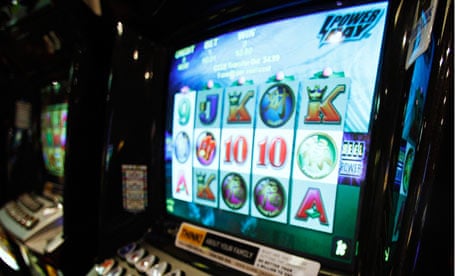'There, look! That is classic problem gambling behaviour right there," says Paul Bendat, pointing to a middle-aged man perched precariously on a stool between two slot machines, which is he playing at the same time, transfixed by the blinking lights.
The wiry-haired lawyer turned anti-gambling activist is standing in the gaming room of the Meadow Inn hotel, situated in Fawkner, an unremarkable northern suburb of Melbourne, Australia's second-largest city. Lines of slot machines – commonly called poker or "pokie" machines, 73 in total – are coiled within the room. Despite it being a weekday mid-afternoon, the venue is virtually full of silent patrons, many of them elderly women. Incongruously, a dining area serving the local delicacy of chicken parmigiana adjoins the gaming room, alongside a children's play area. Both spaces are completely deserted.
Australia has more than 4,000 such licensed clubs. Some are affiliated with sports teams, with facilities ranging from cinemas and golf courses to car washes and hairdressers. However, their financial backbone is gambling.
In a typical year Australians lose AU$19bn (£12.3bn) betting, with $12bn of that poured into nearly 200,000 poker machines. According to the Economist, Australian adults lose an average of US$1,300 each a year gambling, easily the highest in the world. The UK, by comparison, has a per capita loss of under US$400. While a typical British fruit machine has a £50 jackpot, Australian pokies dangle AU$10,000 top prizes. The government estimates that 600,000 people hit the pokies weekly, around 40% of them considered hooked, or at risk of addiction.
At the Meadow Inn hotel, these statistics are embodied in a depressing tableau of punters slouched on stools, jabbing at flashing buttons. One man has cleared some space so that his wheelchair can be drawn alongside the machine. "They're in the zone – it's almost zombie-like," observes Bendat. "There's an aggressive gambling culture you don't see anywhere else." Despite not looking like a typical activist – he is the son of a wealthy shopping magnate – Bendat has waged a lengthy campaign against ALH, a subsidiary of supermarket giant Woolworths, which operates nearly 300 venues across Australia, containing 12,000 poker machines – more than the top five Las Vegas casinos combined.
Bendat has been partially successful in pushing for greater division between gaming floors and children's areas. But clubs are still routinely marketed as family-friendly – the Meadow Inn hotel has a kids' karaoke night, as well as face-painting for children. "These kids are more far more likely to grow up to be problem gamblers," he says.
Critics also contend that the clubs have been deliberately placed in poorer suburbs to suck money from working-class people. The Melbourne suburb of Braybrook, for example, has an average spend of $3,000 per person per year, compared with $145 in the nearby, richer district of Hawthorn.
The Meadow Inn hotel, with its $12.6m annual income from pokies, is small fry compared with the huge "pokie barns" of New South Wales. The state was the first to introduce pokies, in 1956, and is saturated with venues containing up to 800 machines each.
Tim Costello, a Baptist minister, lawyer and CEO of World Vision in Australia, says he saw the impact of pokies in Victoria "overnight" when they arrived in the state in 1992. "It has destroyed lives and caused suicides," he says. "An early client of mine had two houses and her own business and she stole $50,000 to feed into the pokies. She was sent to prison for four years and she had three kids. Before the pokies, 14% of problem gamblers were women; now it's more than half."
Tom Cummings spent three years grappling with his addiction. The IT worker, who kicked the habit a decade ago, burned through more than $100,000, hiding his losses for three years before his partner found out. The couple soon split up. "The pokies were hypnotic," he says. "There are warning signs saying 'Know your limits' but they are useless because your only focus is the screen. I would see women wedge coasters on the buttons of four different machines, put in a few hundreds dollars and just sit back, watching them spin around again and again. People would get into fights over their favourite spots."
Critics of the pokies suggest that state governments are addicted to the tax revenue they generate. "The states' revenues were shrinking and they were relying more and more on the federal government," explains Costello. "Around 12% of Victorian government income comes from pokies. The same in New South Wales."
The latest attempt at reform was scuppered by the political manoeuvres of prime minister Julia Gillard. Reliant on the vote of anti-pokies independent MP Andrew Wilkie to prop up her minority government, Gillard promised to introduce mandatory precommitment, which requires gamblers to set themselves betting limits that are stored on machine-enabling cards. However, in the face of a high-profile campaign by the clubs industry, along with a change of parliamentary speaker that gave Gillard's Labor party an extra MP, she backed away from the scheme.
Clubs Australia, the representative body for clubs in the country, denies that it is profiteering from addiction. "We are a nation of gamblers – the First Fleet were gambling on the way here from England," says spokesman Jeremy Bath. "Clubs offer quality, affordable entertainment to the family. Over 10 million people choose to be a member – people are voting with their feet."
Back at the Meadow Inn hotel in Melbourne, no one is budging from the pokie machines. With the venue open to 6am, there is still a chance to get lucky, even if that means keeping an eye on two machines at the same time.
